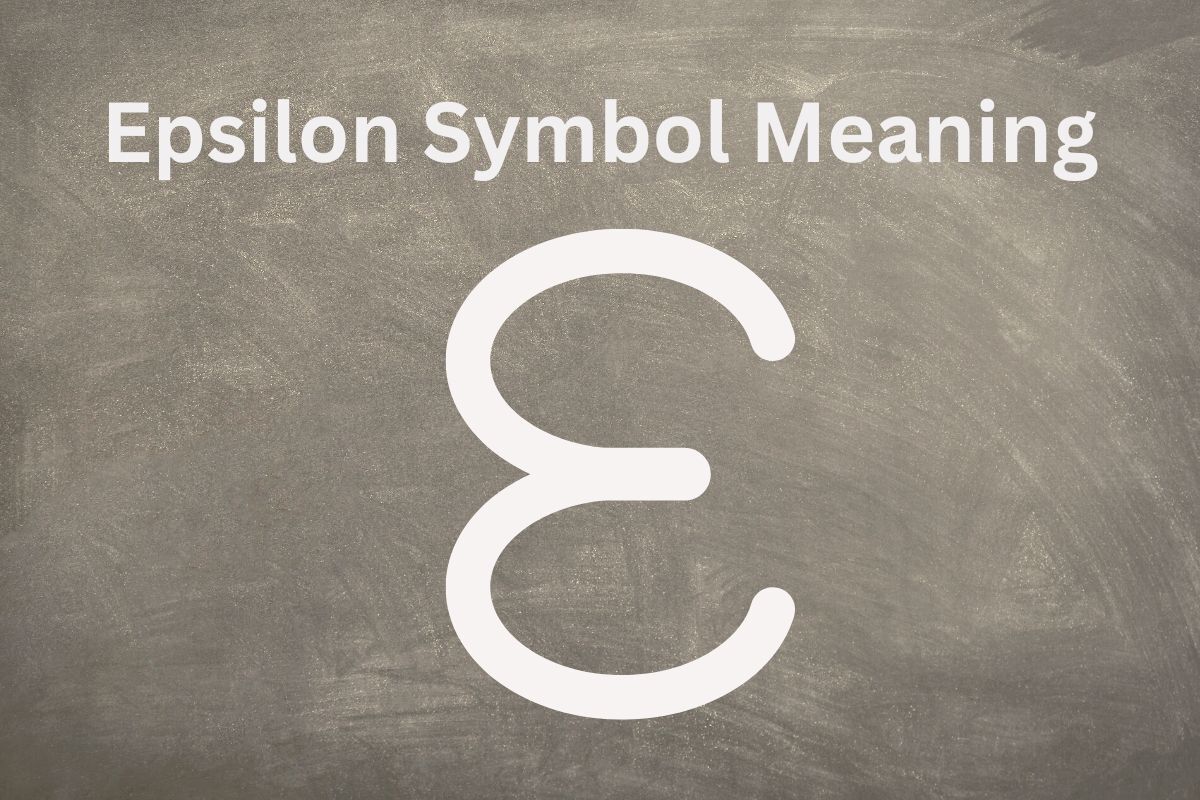Epsilon is the fifth letter in the Greek alphabet that represents the numeric value of 5 and is a variable. Epsilon is written in three forms: uppercase E, lowercase ε, and lunate ϵ. Epsilon is spelled έψιλον in Greek.
Epsilon is used in mathematics and science like many other Greek alphabets. An epsilon denotes a small quantity or value, something close to zero. The lowercase and lunate forms are used more commonly and have different meanings in mathematics.
The Origin of Epsilon Symbol
Epsilon is derived from the Phoenician letter Hē. The symbol came into use when ancient Greeks began alphabet writing. In archaic Greek works, epsilon is still represented as a Phoenician letter.
The uppercase epsilon is similar to the Latin letter E used in the English alphabet. A Latin epsilon, called open e, is written similarly to lowercase ε. However, the Latin epsilon is an IPA (International Phonetic Alphabet) symbol.
The Roman E, Ë, and Ɛ may have come from Greek epsilon. The cursive writing style simplified the epsilon symbol during the classical era.
The fifth letter of the greek alphabet gave birth to Е, È, Ё, Є, and Э in the Cyrillic (Slavonic/ Slavic) script in Eurasia. The lunate ϵ (a semi-circle with a horizontal line) inspired the Euro symbol €.

How is the Epsilon Symbol Used?
Epsilon is a part of mathematics, statistics, science, computer science, and literature. It is majorly used in the following ways:
Greek Language
The uppercase ε (epsilon) is limited to Greek scripts today. The Latin E (capital letter) took precedence over the Greek version.
Physics
Epsilon has different uses in physics and astronomy. It indicates material strain.
The epsilon also represents the permittivity of a medium. If it comes with subset zero (0), it implies the permittivity of free space. Permittivity is seen in electromagnetism. In other words, it measures a material’s ability to interact with an electric field and be polarized.
Epsilon in astronomy denotes the fifth brightest star in a constellation. Planet Uranus’ farthest ring (the one visible to scientists) is also named epsilon. In planetary science, the symbol denotes a tilt in the axis.
Mathematics
The epsilon symbol has a varied role in mathematics and statistics. It denotes a random/ small positive measure in Calculus. The value is above zero but still close to it. The famous German mathematician, David Hilbert, used epsilon symbols for the first-order logic in calculus.
The epsilon is also called a Levi-Civita symbol. It denotes dual numbers in linear algebra and represents the Heaviside (unit) step function, named after Oliver Heaviside. In statistics, the epsilon symbol means errors and degree of sphericity in the analysis of variance (ANOVAs).
Other Subjects
- Epsilon in agricultural science denotes the photosynthetic efficiency of a plant.
- Elasticity (change of one variable to another) is represented by the Greek small letter epsilon in economics.
- Lowercase epsilon denotes the molar extinction coefficient of a chemical species in Chemistry. It measures how well the species can absorb Light at a given wavelength.
- The Greek epsilon is called machine epsilon in the computer science language. It implies the upper bound of an error or an empty string of words. In lowercase, it is used with another Greek symbol, lambda (λ).

What Does the Epsilon Symbol Mean Spiritually?
Epsilon’s spiritual significance is limited. The symbol is not commonly used in religion and spirituality. While the epsilon does not have an extensive religious use, the ancient Greeks used epsilon to create the Delphic epsilon and worship the sun god.
Using two epsilons to create a design could imply the fusion of masculine and feminine energy. This fused symbol is found in pendants and carved onto the walls. It could also mean the creation of a portal into the path of wisdom or light.
What is Delphic Epsilon?
Delphic epsilon is also known as the epsilon of Delphi. It is an ancient Greek symbol that represents a person’s initiation into the light. The symbol (which looks like a key) is inscribed in the Temple of Apollo to worship the Sun god (Apollo is the God of the Sun).
The Delphic epsilon was created by the Seven Sages or the Seven Wise Men of Greece. The symbol had the following meaning in ancient Greek:
- A union of the trinity (three parallel lines together)
- A cosmogenic representation of Nature elements- earth, fire, air, water, and ether
Plutarch, a lifelong priest of Apollo, wrote in his books about the Delphic epsilon and other inscriptions in the Temple of Apollo.

Mythology and Meaning
The epsilon symbol in Greek is connected to the Delphic Solar Mysticism, which is man’s initiation into the Light. The Delphic epsilon is placed on the top predicament of the Temple with Γνώθι Σαυτόν (know thyself) and Μηδέν Άγαν (nothing in excess) inscribed on its sides at the lower ends.
How to Write Epsilon in Computers
Alpha, beta, lambda, eta, theta, phi, kappa, zeta, rho, and sigma are Greek symbols commonly used in mathematics, statistics, and physics. Here’s how to write the epsilon symbol using a keyboard:
- Lowercase ε: ALT+ 238
- Lowercase with tonos: ALT+ 941
- Lunate epsilon ϵ: ALT+ 1013
- Uppercase E: ALT+ 917
- Uppercase with tonos: ALT+ 904
- Reversed lunate: ALT+ 1014
Use CTRL, G, and E to write the epsilon symbol in lowercase on Mac. Activate the caps lock and use the same command for upper case epsilon. It is written as U+03B5 in Unicode.
The Greek epsilon’s significance is more mathematical than spiritual or mythological.
If you’ve enjoyed this article, check out our post on the Chi Rho symbol.

